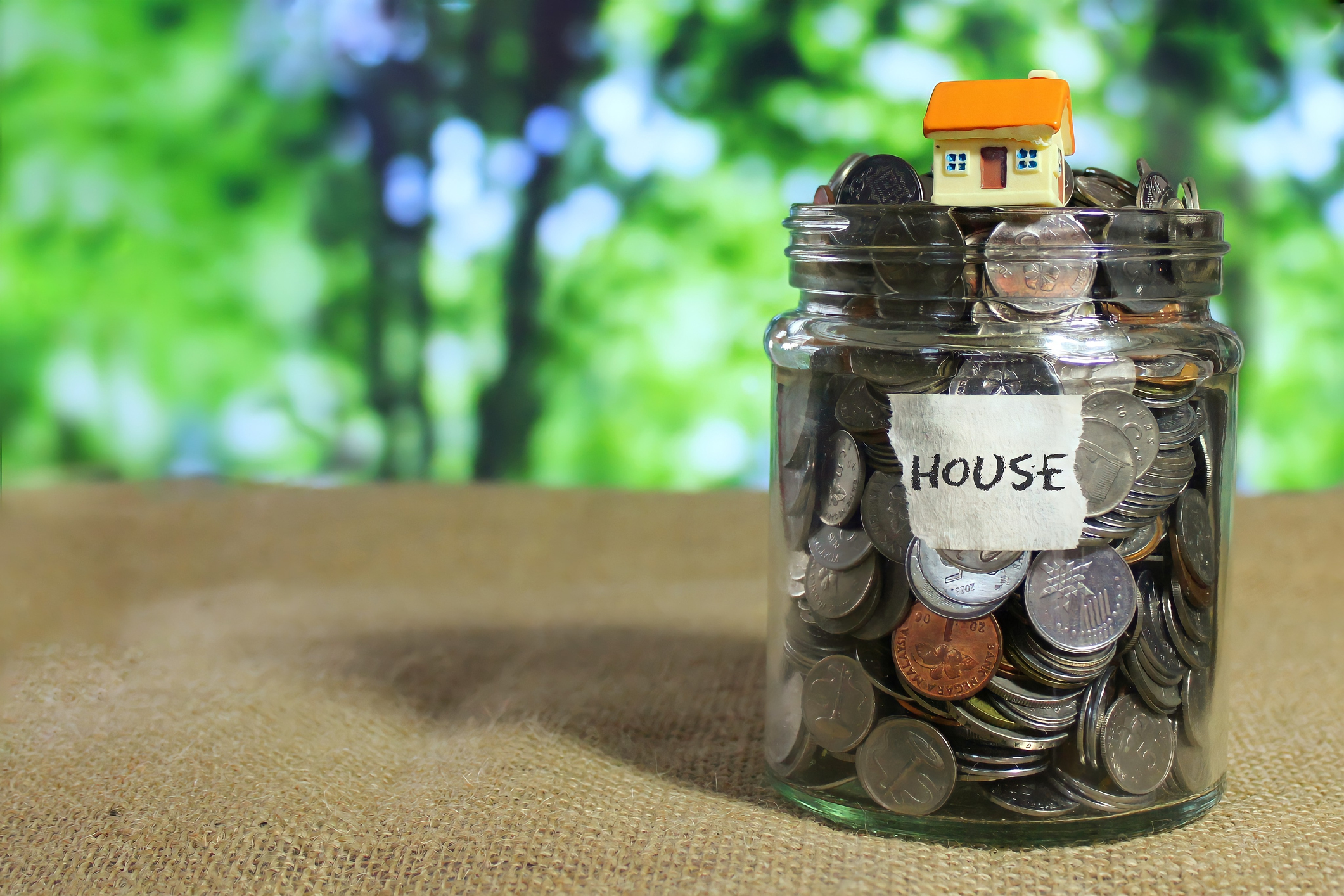Saving for a down payment on a house is not easy, especially in the aftermath of COVID-19. But don’t lose hope! It is still possible to save for a down payment— maybe even more possible than you think. With discipline, budgeting, and careful planning, you’ll have your down payment in due time.
Need help getting started? Here’s everything you need to know about saving for a house:
How much money should I save before buying a house?
If you’re wondering how much a down payment on a house is, the short answer is: It depends. Traditionally, a down payment on a house is about 20% of your ideal home’s purchase price, plus additional funds to cover costs along the way. This could include costs for closing, performing a home inspection, and, eventually, your final moving costs like hiring a moving company, purchasing new furniture, and more.
If you’re a first-time home buyer saving for a house, speaking to a local real estate agent and loan officer is also a good idea. These professionals will help you determine how much you can afford, and you can decide how much you’d like to spend, too. Be sure to check out a saving for a house calculator beforehand to come to the meeting prepared!
How to Save for a House Down Payment: 6 Helpful Tips
Whether you’re looking to save for a house fast or are just getting started on a long-term home-buying journey, having a solid amount of money saved up is incredibly helpful. Here are just a few tips that can help you build up that extra cushion of cash:
1. Create a budget to limit unnecessary spending
If you’ve never created a budget before, don’t panic. It really is as simple as it sounds, and doesn’t need to be complicated. Grab a notebook or planner and write down all of your expenses. Include absolutely everything from gas for your car, groceries, and “going out” money. From there, you can budget any additional income you receive for savings, and take a look at where you might be able to cut back any unnecessary spending.

Pro tip: It’s helpful if you have a calendar to plan your bill payments and see where you can save.
2. Focus on paying off debt first
It may seem difficult to figure out how to pay your bills, pay off debt, and save for a house all at once. That’s why it may be better for you in the long run to focus on paying off any debt you’ve accrued before you begin saving for a house down payment. Plus, it will help you in the long run!
The amount of money you’re paying to student loans and credit cards adds up, and once it’s fully paid off, you’ll be able to allocate that towards your new home. Need some extra guidance? Dave Ramsey has a great debt snowball calculator that can help you figure out your “debt-free date.”
3. Consider getting a roommate
If you can take on a roommate in your current living situation, it can help you offset living expenses by quite a bit. Then, you can allocate those funds you would have been using on rent toward your savings.
Be cautious and diligent when choosing a roommate. You may already know someone looking for a place, or you can use sites like RoomieMatch to find one. Pro tip: Once you save enough money to purchase your house, this roommate can potentially take over your current lease in the right situations!
4. Declutter and sell the excess
It’s always a good time to declutter, but even better when you sell unused items for extra cash! Use resources like Facebook Marketplace, Craigslist, OfferUp, Poshmark (for clothes), or Ebay to reach more people and sell unique items. Any extra cash you make from selling unwanted clothes, books, games, or any other items can be put towards saving for your house down payment.
“Decluttering in three simple steps can ease the trouble of going through all of your things. Start by setting a timeline, then decide what you will keep and get rid of, lastly, purge all of the clutter by donating or throwing away.” – Budget Dumpster, 2021
Related: How to Downsize Your Home [Free Checklist]
5. Start a side hustle
In a gig economy, you may already have a side hustle. But if you don’t, starting a side hustle can be a great way to bring in additional income that can be saved for a down payment on a new house. For as little as 5 hours per week, you can freelance in an area of expertise you currently have, take a job waiting tables or bartending, work retail, or try dropshipping.
6. Save any additional income
This may seem like a no-brainer, but if you receive any money you didn’t expect from a random source, you can set those funds aside in separate savings accounts specifically for your house and any costs involved in the moving process. Mail-in rebates, testing websites/apps, surveys, miscellaneous tasks, affiliate marketing, and advertising revenue on social media (Youtube, TikTok, or Instagram) can all be great ways to rack up extra money!

Related: The Most Important Things to Know Before Buying a House
How to Save Money for a House While Renting: A Live Example
To put things into perspective with hard numbers, here’s an example of an individual assessing their monthly finances and creating a budget to save for a down payment:
Marissa, a single woman, is ready to start saving for a new home after renting her own 2-bedroom apartment for three years.
These are her current expenses:
- Rent – $1,200/month
- Electric/Gas/Water – $200/month
- Internet – $100/month
- Cell Phone – $100/month
- Groceries – $200/month
- Car Payment – $400/month
- Car Insurance – $150/month
- Beauty/Skincare/Shopping – $200/month
- Going Out to Eat – $200/month
- Credit Card Debt/Student Loans – $200/month
- Health Insurance – covered by work
- Retirement Contribution – $200
Total Expenses = $3,150 per month
Total Current Net Income (from her full time job) = $5,000 per month
Remaining Income After Expenses = $1,850 per month
Marissa can ideally cut the following expenses from her current budget in order to maximize her savings:
- Find a roommate (saves $400)
- Practice at-home beauty/skincare and restrict unnecessary shopping (saves $200)
- Explore different cell phone service providers (save $20)
- Prepare more meals at home, meal prep (save $100)
- Shop around for better car insurance (save $30)
By following these lifestyle changes, Marissa will save about $750 per month. At that rate, she will be able to save an additional $9,000 annually while living in a rental apartment.
If Marissa wishes to buy a $200,000 home and saves diligently for 5 years, she will have enough money for a down payment on her new home. This doesn’t count any additional money she may bring in from further reducing her expenses, paying off her credit card debt and student loans, or picking up a part-time job on the weekends for extra cash. Realistically, Marissa may even be able to afford her house down payment even sooner!
Alternatives to Saving for a Down Payment
It’s important to note that there are also other alternatives to a traditional mortgage. According to Mortgage Loan, you may also pursue the following to gather funds for homeownership:
- “Borrow from a Retirement Account;
- Your parents;
- Your insurance policy;
- Or find a co-signer;
- Seller financing;
- Rent to own.”
By writing down her current expenses and creating a reasonable budget, Marissa can clearly evaluate where there are opportunities to cut down on expenses. She may even create better spending habits in the meantime! If that doesn’t prove to be enough, Marissa can look into alternative options for funds or consider finding new ways to supplement her income.
Related: Moving Into a New House? Do These 7 Things First
Saving for a House Down Payment?
Saving for a down payment on a house isn’t easy, but with proper planning, strategy, determination, and discipline, it is possible. Regardless of our economic situation, there are always ways to cut back on spending, even if at first, you don’t think these choices are conducive to your lifestyle.
At the end of the day, it all comes down to really thinking about what’s important to you. If purchasing a home and saving for a down payment is high on your priority list, you’ll need to make some sacrifices along the way. It’ll all be worth it when you can proudly put down that money you’ve saved for the down payment on your brand new house!







